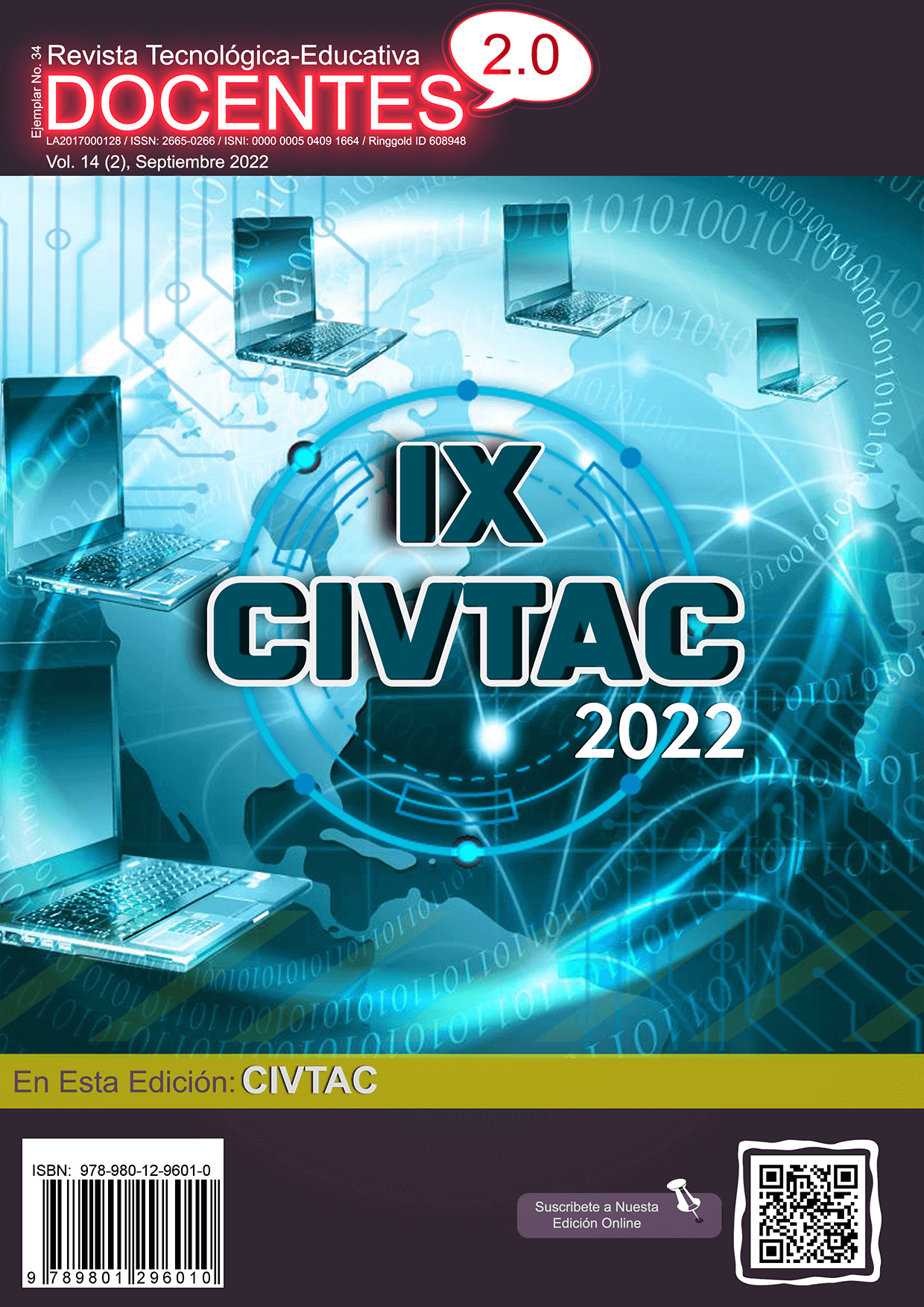Pedagogical Strategy to Develop Research Competencies in Medical Sciences Teachers
 DOI:
https://doi.org/10.37843/rted.v14i2.301
DOI:
https://doi.org/10.37843/rted.v14i2.301
Main Article Content
Abstract
The need of contemporary man to face daily different situations in the personal and professional field has led him to investigate, professionally or not, how to find the best solution to the problems that arise daily. Hence, this article aimed to design a pedagogical strategy to develop investigative skills in Medical Sciences teachers that contributes to professional-pedagogical performance. An investigation was carried out under the historical-logical method, under the pragmatic paradigm, with a hybrid approach of Sequential type with Explanatory design. Of the population established with 67 professors summoned to participate in said research, 35 were chosen, representing 23.45% of the population, an intentional non-probabilistic sample. The results of the instruments after the proposal was applied allowed to recognize the professional and human improvement of the teachers of medical sciences and the development of investigative competencies applied in their professional performance. The teacher-researcher role implies permanent reflection, assuming a critical attitude about what has been learned in their training, and sharing knowledge with their peers and students to establish synergies between what is learned and researched and what is taught and why. The study and the systematization made it possible to determine the theoretical foundations that support the development of investigative competencies in the context of Medical Education and specifically in the Faculty of Medical Sciences of Artemisa.
Downloads
Metrics
Article Details

This work is licensed under a Creative Commons Attribution-NonCommercial-NoDerivatives 4.0 International License.
Those authors who have publications in our journal accept the following terms:
- When a work is accepted for publication, the author retains rights of reproduction, distribution of his/her article for exploitation in all countries of the world in the format provided by our magazine and any other magnetic medium, optical, and digital.
- Authors will retain their copyright and guarantee the journal the right first to publish their work, which will be simultaneously subject to the Creative Commons Acknowledgment License (Attribution-NonCommercial-NoDerivatives 4.0 International (CC BY-NC-ND 4.0)). That allows third parties to copy and redistribute the material in any medium or format, under the following conditions: Acknowledgment - You must properly acknowledge authorship, provide a link to the license, and indicate if any changes have been made. You may do so in any reasonable way, but not in a way that suggests you have the licensor's endorsement or receive it for your use. NonCommercial - You may not use the material for a commercial purpose. NoDerivatives - If you remix, transform, or build from the material, you cannot broadcast the modified material. There are no additional restrictions - You cannot apply legal terms or technological measures that legally restrict you from doing what the license allows.
- Authors may adopt other non-exclusive license agreements to distribute the published version of the work (e.g., deposit it in an institutional archive or publish it in a monographic volume) provided that the initial publication in this journal is indicated.
- Authors are allowed and recommended to disseminate their work through the Internet (e.g., in institutional telematic archives, repositories, libraries, or their website), producing exciting exchanges and increasing the published work's citations.
- Request of withdrawal an article has to be done in writing by the author to the Editor, becoming effective after a written response from the Editor. For this purpose, the author or authors will send correspondence via e-mail: [email protected].
- The author will not receive financial compensation for the publication of his work.
- All Docentes 2.0 Journal publications are under the Open Journal System (OJS) platform at: https://ojs.docentes20.com/.
References
Aznar, I., Cáceres, M. P., & Hinojo, M. A. (2011). La adquisición de competencias específicas en la educación superior. Evaluando la formación del psicopedagogo en la Universidad de Granada. Ensayos, 26, 73-93. http://dx.doi.org/10.18239/ensayos.v26i0.70
Cázares, L., & Cuevas de la Garza, J. (2016). Planeación y evaluación basada en competencias: fundamentos y prácticas para el desarrollo de competencias docentes, desde preescolar hasta el posgrado. Trillas.
De Armas-Ramírez, N. (2003). Caracterización y diseño de los resultados científicos como aportes de la investigación educativa. Curso pre- reunión Nº 85. Evento Pedagogía 2003.
Díaz-Barriga, A. (2011). Competencias en educación. Corrientes de pensamiento e implicaciones para el currículo y el trabajo. Revista Iberoamericana de Educación Superior, 11(5), 3-24. http://www.redalyc.org/articulo.oa?id=299123992001 DOI: https://doi.org/10.22201/iisue.20072872e.2011.5.44
Gallardo, O. (2003). Modelo de Formación por Competencia para Investigadores. Revista Contexto & Educación, 18(70), 9-25, e-ISSN: 2179-1309. https://www.revistas.unijui.edu.br/index.php/contextoeducacao/article/view/1141
Hernández-Sampieri, R., Fernández-Collado, P., & Baptista-Lucio, M. P. (2006). Metodología de la investigación (4ta, ed.). Mc Graw-Hill.
Jaik, A. (2013). Competencias investigativas. una mirada a la educación superior. (ReDIE, Ed.) http://iunaes.mx/wp-content/uploads/2013/11/LIBROCOMPETENCIAS-INVESTIGATIVAS.pd
Marrero, O., & Pérez, M.A. (2015). Competencias investigativas en la educación superior. Res Non Verba. https://biblio.ecotec.edu.ec/revista/edicionespecial/COMPETENCIAS%20INVESTIGATIVAS%20EN%20LA.pdf
Mejía, E., Novoa, E., & Villagómez, A. (2014). Metodología de la investigación. Cuantitativa – cualitativa y redacción de la tesis. Ediciones de la U.
Oramas, R. (2012). Modelo del docente para los escenarios docentes de la carrera de Medicina. (tesis en opción al grado científico de doctor en ciencias). Universidad de Ciencias Pedagógicas “Enrique José Varona”.
Rodríguez, D., Armengol, C., & Meneses, J. (2017). La adquisición de las competencias profesionales a través de las prácticas curriculares de la formación inicial de maestros. Revista de Educación, 376, 229-251.
Tobén, S., Sánchez, A. R., Carretero, M. A., & Garcia, J. A. (2006). Elaboración del currículo universitario con base en competencias. En S. Tobén, A. R. Sanchez, M. A. Carretero y J. A. Garcia (Eds). Competencias, calidad y educación superior. Cooperativa Editorial Magisterio.






